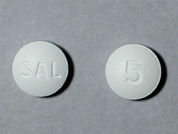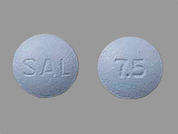Salagen
Salagen generic name: Pilocarpine Hcl
What is Salagen used for?
This medication is used to treat symptoms of dry mouth due to a certain immune disease (Sjogren's syndrome) or from saliva gland damage due to radiation treatments of the head/neck for cancer. Pilocarpine belongs to a class of drugs known as cholinergic agonists. It works by stimulating certain nerves to increase the amount of saliva you produce, making it easier and more comfortable to speak and swallow.
CHEMICAL NAME
DRUG TYPE
Throat/Mouth ConditionsSalagen Prices
Searching for the lowest prices
Salagen Frequently Asked Questions
Take this medication by mouth with or without food as directed by your doctor, usually 3 to 4 times daily. The dosage is based on your medical condition and response to treatment.
To reduce your risk of side effects, your doctor may direct you to start this medication at a low dose and gradually increase your dose. Follow your doctor's instructions carefully.
Take this medication regularly to get the most benefit from it. To help you remember, take it at the same times each day.
You may continue to drink water or use saliva substitutes as needed for moisture in your mouth.
You may start to feel some benefit in 1 to 2 weeks. However, it may take up to 3 months to feel the full benefit. Tell your doctor if your condition lasts or gets worse.
IMPORTANT: HOW TO USE THIS INFORMATION: This is a summary and does NOT have all possible information about this product. This information does not assure that this product is safe, effective, or appropriate for you. This information is not individual medical advice and does not substitute for the advice of your health care professional. Always ask your health care professional for complete information about this product and your specific health needs.

